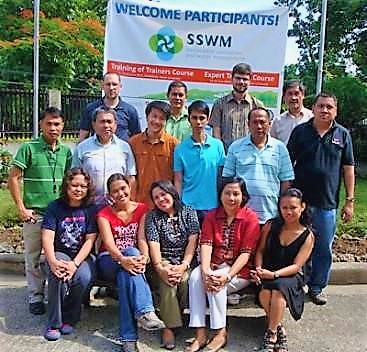Executive Summary
The returns from investing in training depend crucially on the quality, motivation and appropriateness of the participants. Hence, it is very useful to define specific requirement criteria in advance, to attract the right participants. Also, if the demand for a course exceeds the number of seats, you will need to select the most appropriate participants on the base of clear and unambiguous selection criteria. Including the right participants improves the impact of a course or workshop.
Introduction
What you achieve with a course depends to a large extent on the motivation and appropriateness of participants. Hence, the requirement criteria for participants have to be defined keeping in mind the type and aims of the training given. They should be clear and unambiguous, and promote the prospects of maximising activity benefits and achieving sustainable impacts.
Selecting Course Participants

Several different aims can be accommodated in the selection of participants. Key criteria, depending on the aim of the training or workshop, might include (adapted from SUSAN 1998):
- Priority for committed personnel who will stay in the Sustainable Sanitation and Water Management (SSWM) field and apply in practice what is learned.
- The need of an individual to apply new knowledge and skills on this topic. It is sometimes the case that organisations send their most experienced/most senior staff member – who may have been too many previous workshops, and need this one least.
- Networking– cross-sectoral participants: A workshop or training can encourage day to day cooperation among actors if they are together in an effective learning environment (USAID 2001). This might mean increasing awareness among local journalists by inviting them to be part of some/all of the workshop; or local officials or politicians; other partner NGOs etc. This can help enrich discussion, and increase awareness of the roles of the various actors (state and non-state) in achieving knowledge on SSWM. The networking importance of workshops/training should not be underestimated (see also: media campaigns).
- Strengthen organisations collaboration: There is often competition among organisations working for the same field. This can undermine practical co-operation among colleagues. In contrast, colleagues who come together for training can use the opportunity to develop or strengthen a coalition for advocacy.
Challenges
Unfortunately, very often, course organisers will face that:
- Invited participants only confirm participation at the last minute.
- After confirming they will attend, fail to show up. This wastes a place that could have been allocated to another person.
- Participants attend some but not all sessions in a workshop. This undermines the utility of the workshop not only for the individual, but also for the group. This is because an effective workshop builds knowledge in steps, module by module. If one part of the foundation is missed, a participant may not grasp later stages of the workshop, or may delay the group by asking questions that have already been dealt with.
These problems can partly be overcome with asking for a course fee that has to be paid (at least partly) in advance. However, the demanded course fee will highly influence the composition of participants, as some people may not be able or may not want to pay a high course fee. Discounts for students, NGOs or poorer participants may ease this problem and will ensure a more heterogeneous group. Also the means and channels to market a training will highly influence the composition of participants.
Even if course costs are covered by other sources, whenever possible courses should not be offered completely for free. It will attract people that have “nothing else to do” and not necessarily those on whom a training might have the biggest impact. Even worse, it may occur that participants are paid to participate in workshops – even for those who are in employment and paid (e.g. as public servants) to be present. This not only inflates the cost of workshops – but it is an indication of lack of real commitment to learning and should be discouraged.
Conclusion
So, issues to address while identifying participants can be summarised as follows (PATRICK 2009);
- Choose the right number of people. You may want to have a small group (to provide intensive support) or a larger group (to have a wide range of inputs).
- Find the relevant people. You may want to specify that you need participants who will be in a position to use the skills and/or train others when they return to their organisations.
- Ensure the right combination of people. You might want to have participants with similar experiences to ensure equal input or a mixture to facilitate specific learning.
- Aim for the right level of participation. You may want to insist that participants attend the whole workshop rather than coming and going. It should also be made clear that everyone will be required to participate.
Consult participants before planning the workshop. You may want to ask participants in advance about their expectations of the workshop, as well as their existing level of experience by conducting a learning needs analysis. Talking to participants before the workshop is planned helps to ensure that the content is at the right level, and that materials and activities are relevant for everyone.
The requirement criteria for participants of a specific training have to be defined carefully. This activity help the trainer to deliver the training in the interest of the target participants (INGRID 2005). Trainers need to address the selection procedure with good care. If you do not understand the participants well enough to know who can be of most use, do not be afraid to ask participants that you have to train. Carefully defining requirement criteria (e.g. the completion of a previous module, or a certain job position) helps you to compile the group in a manner so that you can achieve the biggest outcome.
Facilitating with ease! Core skills for facilitators, team leaders and members, managers, consultants and trainers
Improve Your Coaching & Training Skills
Using Adult Learning Principles in Adult Basic and Literacy Education
This journal article contains information on adult learning principles, and provides you with some basic and very useful information on how to organise and facilitate a training.
SUSAN, I. (1998): Using Adult Learning Principles in Adult Basic and Literacy Education. Columbus: Centre on Education and Training for Employment URL [Accessed: 29.04.2010]Training Methodologies and Principles of Adult Learning
A Training-of-Trainers manual to strengthen the capacity of a team of trainers by applying different training methodologies and principles of adult learning to the trainings of health service personnel, NGO staff and community-based health workers.
TSHIULA, J. MARYANNE, S. J. (2005): Training Methodologies and Principles of Adult Learning. United States: United States Agency for International Development (USAID) URL [Accessed: 29.04.2010]A Facilitators Guide to Participatory Workshops with NGOs/CBOs Responding to HIV/AIDS
This guide aims to support people who facilitate participatory workshops with non-governmental organisations (NGOs) and community-based organisations (CBOs) responding to HIV/AIDS in developing countries. It contains also some general information on workshop facilitation.
USAID (2001): A Facilitators Guide to Participatory Workshops with NGOs/CBOs Responding to HIV/AIDS. United Kingdom: International HIV/AIDS Alliance URL [Accessed: 07.05.2012]Facilitating With Ease
Teaching Adults
The volunteers’ teaching series gives an insight to adult learning practices.
DAUGHERTY, A.R. (1978): Teaching Adults. Oklahoma: Division of Agricultural Sciences and Natural Resources, Oklahoma State University URL [Accessed: 29.04.2010]A Trainers Guide for Participatory Learning and Action
This trainers guide provides guidelines for participatory learning and action, which can be applied for any training or workshop.
GUIJT, I. PRETTY, J. SCOONES, I. THOMPSON, J. (1995): A Trainers Guide for Participatory Learning and Action. London: International Institute for Environment and DevelopmentParticipation and Social Assessment: Tools and Techniques
This resource kit aims to share information and experiences on participatory methods in the context of development cooperation. The primary focus concentrates on providing practical guidance and case examples.
RIETBERGEN-McCRACKEN, J. NARAYAN, D. WORLD BANK (1998): Participation and Social Assessment: Tools and Techniques. Washington: World Bank URL [Accessed: 10.05.2010]Tools for Community Participation. A Manual for Training Trainers in Participatory Techniques
This manual focuses on one approach to participatory training which PROWESS has applied in numerous projects and workshops. Intended primarily for the training of trainers in participatory techniques, it describes these techniques in a "how to" step-by-step fashion. This manual is also intended to be a "discussion starter" and delves into some of the political issues underlying participation and the often conflicting priorities of communities and development practitioners.
SRINIVASAN, L. (1990): Tools for Community Participation. A Manual for Training Trainers in Participatory Techniques. New York: PROWESS/UNDP Technical SeriesUsing Adult Learning Principles in Adult Basic and Literacy Education
This journal article contains information on adult learning principles, and provides you with some basic and very useful information on how to organise and facilitate a training.
SUSAN, I. (1998): Using Adult Learning Principles in Adult Basic and Literacy Education. Columbus: Centre on Education and Training for Employment URL [Accessed: 29.04.2010]Training Methodologies and Principles of Adult Learning
A Training-of-Trainers manual to strengthen the capacity of a team of trainers by applying different training methodologies and principles of adult learning to the trainings of health service personnel, NGO staff and community-based health workers.
TSHIULA, J. MARYANNE, S. J. (2005): Training Methodologies and Principles of Adult Learning. United States: United States Agency for International Development (USAID) URL [Accessed: 29.04.2010]A Facilitators Guide to Participatory Workshops with NGOs/CBOs Responding to HIV/AIDS
This guide aims to support people who facilitate participatory workshops with non-governmental organisations (NGOs) and community-based organisations (CBOs) responding to HIV/AIDS in developing countries. It contains also some general information on workshop facilitation.
USAID (2001): A Facilitators Guide to Participatory Workshops with NGOs/CBOs Responding to HIV/AIDS. United Kingdom: International HIV/AIDS Alliance URL [Accessed: 07.05.2012]Delivering Effective WASH Training
This Trainer Manual is to support people who facilitate Delivering Effective WASH Training (DEWT). It is based on the practical experience of the CAWST, the Centre for Affordable Water and Sanitation Technology.
CAWST (2015): Delivering Effective WASH Training. Alberta: Centre for Affordable Water and Sanitation Technology CAWST URL [Accessed: 19.08.2015]Sample Format of Criteria of Participation
Sample Format of Registration Form
Sample Format of List of Participants
http://teaching.berkeley.edu/
This site provides you with many tools for teaching. This specific site gives information on how to prepare a large lecture course.
http://serc.carleton.edu/
Provides Tools for Teaching, training techniques and adult training strategies.

